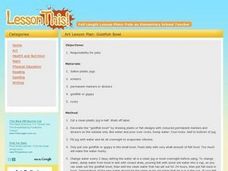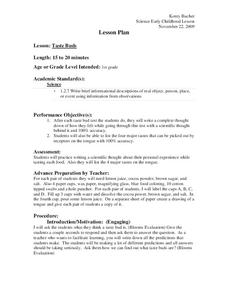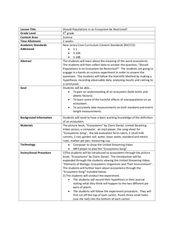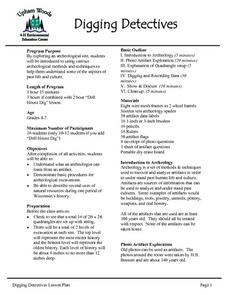Curated OER
Galileo's Thermometer: Measuring the Density of Various Unknown Liquids
Sprouting scientists explore the concept of density by making mass and volume measurements for five different liquids. From these measurements, they calculate densities. They apply their learning to explain Galileo's thermometer works...
Curated OER
Ziplock Chemistry
Students investigate various chemical reactions when creating mixtures in ziplock baggies. In this chemistry instructional activity, students will recognize various chemical reactions and cite evidence. Safety and assessment strategies...
Curated OER
Goldfish Bowl
Students discover proper pet care by creating a home for a fish. In this pet responsibility lesson, students create a goldfish bowl by cutting a plastic jug in half and decorating it with markers and stickers. Students are given their...
Curated OER
Taste Buds
First graders taste a variety of items and record a full sentence about the way they taste. In this taste buds lesson, 1st graders predict and then taste various items. Students draw a picture of the tongue and show the part that...
Curated OER
Keeping Warm
Fifth graders measure the temperature of water using a thermometer. They record the temperatures of water on a chart. Students use the temperature data to determine which materials are the best conductors of heat. They discuss their...
Curated OER
A Potting We Will Go
Students read A Tree is Nice and It Could Still Be a Tree. For this tree planting lesson, students compare and contrast private property and common resources. Students identify the needs of a tree and follow the directions to plan a tree...
Curated OER
Should Populations in an Ecosystem be Restricted?
Fourth graders experiment to determine how overpopulation effects ecosystems specifically plants. In this ecosystem lesson, 4th graders conduct an ecosystems experiment after listening to Claire Daniel's, Ecosystems. They watch a video,...
Curated OER
Digging Detectives
Students demonstrate basic procedures for archeological excavations. They explore an archeological site, students using various archeological methods and techniques to determine some of the aspects of past life and culture.
Curated OER
Wacky Water Critters
Students visit a local creek or stream. They collect water samples from the creek and observe and sort the "water critters" they find in the sample, observing smaller organisms under a microscope if necessary. They identify each organism...
Curated OER
A Visit to Price Chopper
Students visit the grocery store to purchase items to make trail mix which are connected to Kansas agriculture. They problem solve to determine which products to buy, then create, advertise and sell the trail mix to the student body...
Curated OER
Plant Roots
Students discover the purpose of plant roots and how they move water through a vascular system. They conduct an experiment using colored water to observe the movement of water through the roots and stem of a plant in a controlled...
Curated OER
Keeping Warm?
Fifth graders explore conductors and heat loss in different materials. In this Physical Science lesson plan, 5th graders will be measuring the temperature drop of water in four containers. The class will then discuss what an insulator,...
Curated OER
Making Embryo Sets
Young scholars preserve embryos to study embryonic development from day 3 through 21.
Curated OER
Growing Jack and the Beanstalk Plants
First graders investigate how plants grow by growing their own "beanstalk", (after reading "Jack and the Beanstalk") and record their observations daily in a science journal.
Curated OER
Conserving Land, Water and Air
Students take a hands on approach to learning about conservation. For this conservation lesson students divide into groups and complete several demos, view a PowerPoint presentation and complete a handout.
Curated OER
Compost Columns
In this unit of lessons, middle schoolers examine the role of compost columns and recycling. They create a KWL chart about garbage in Chicago. They also examine life cycles and packaging of everyday products.

















